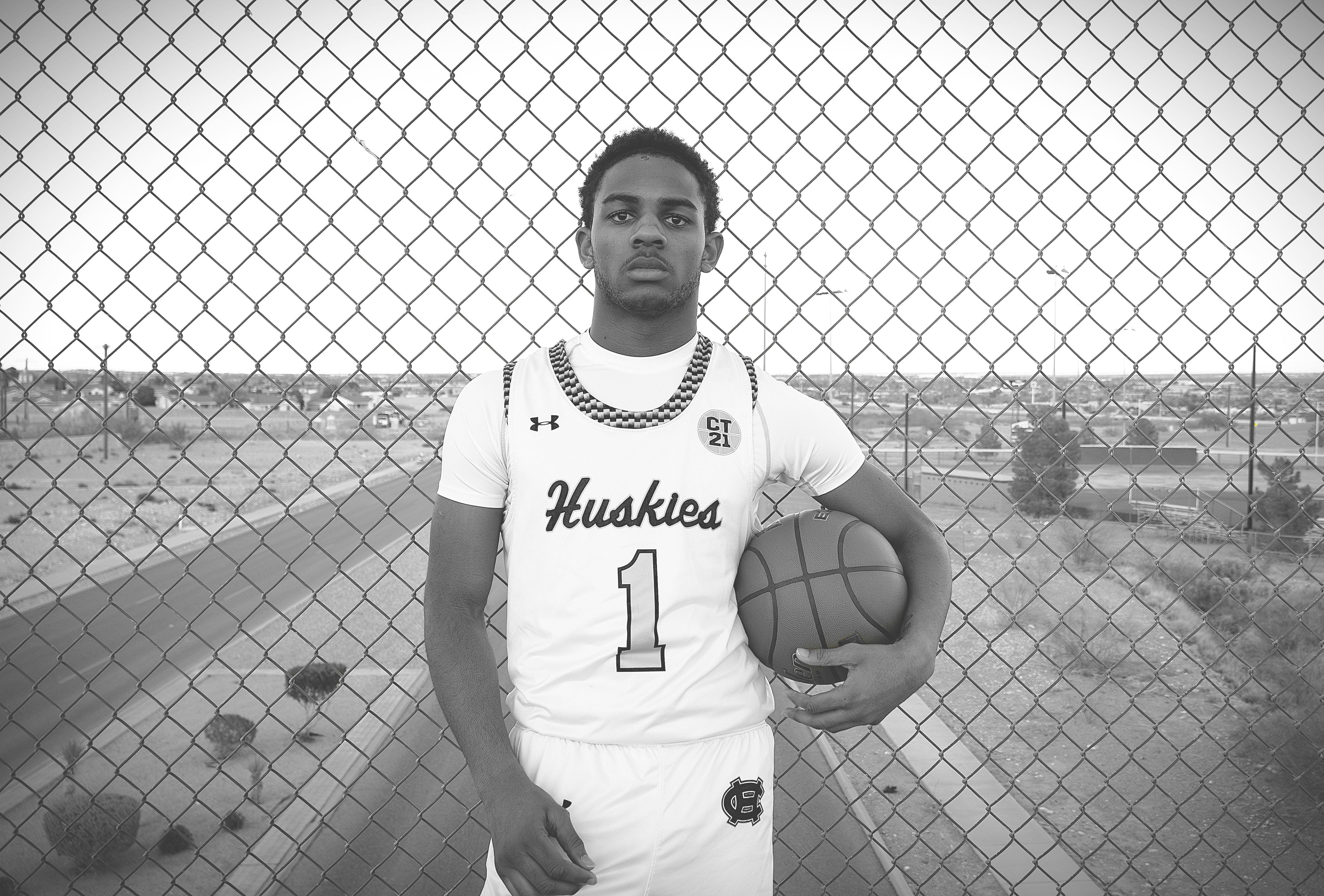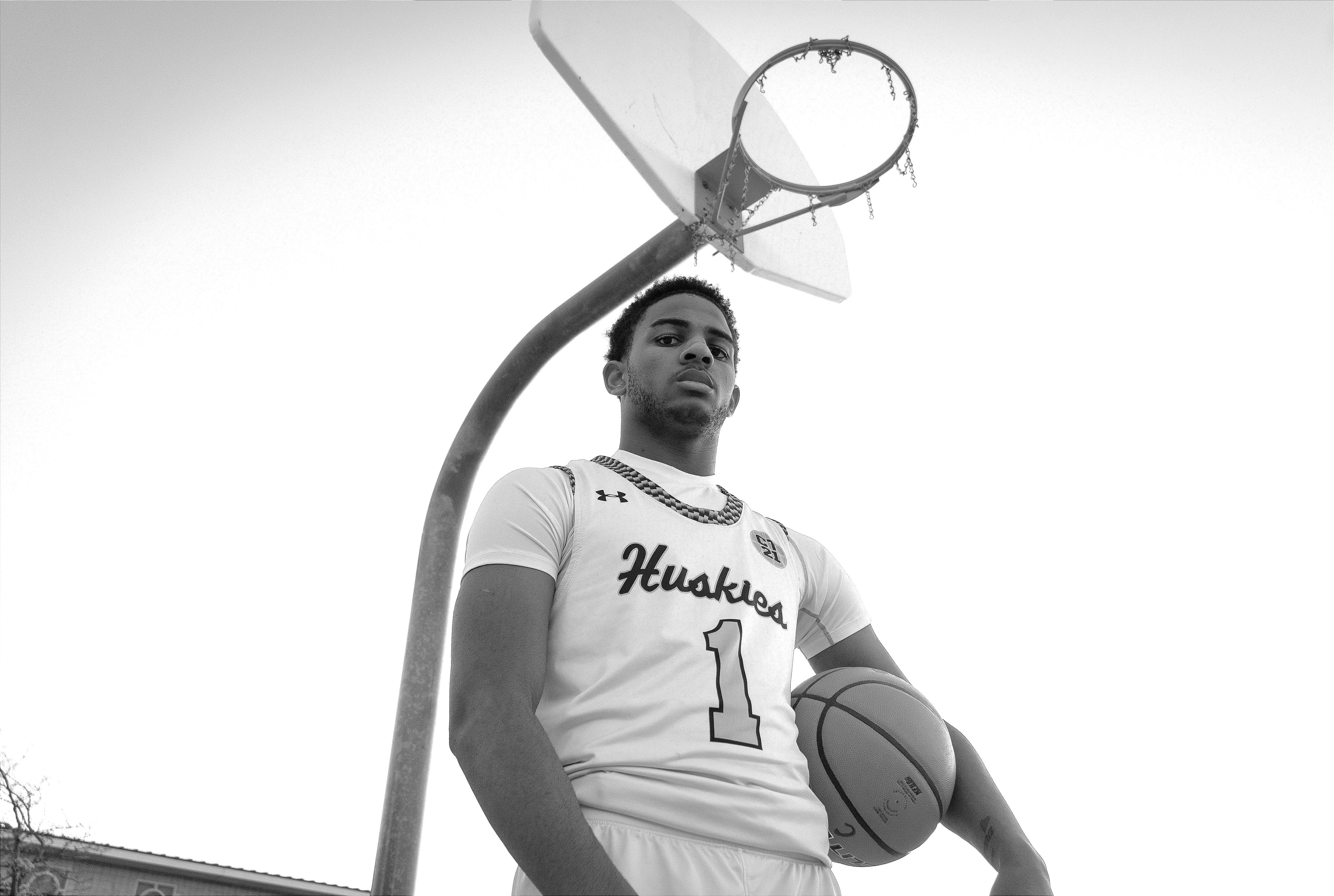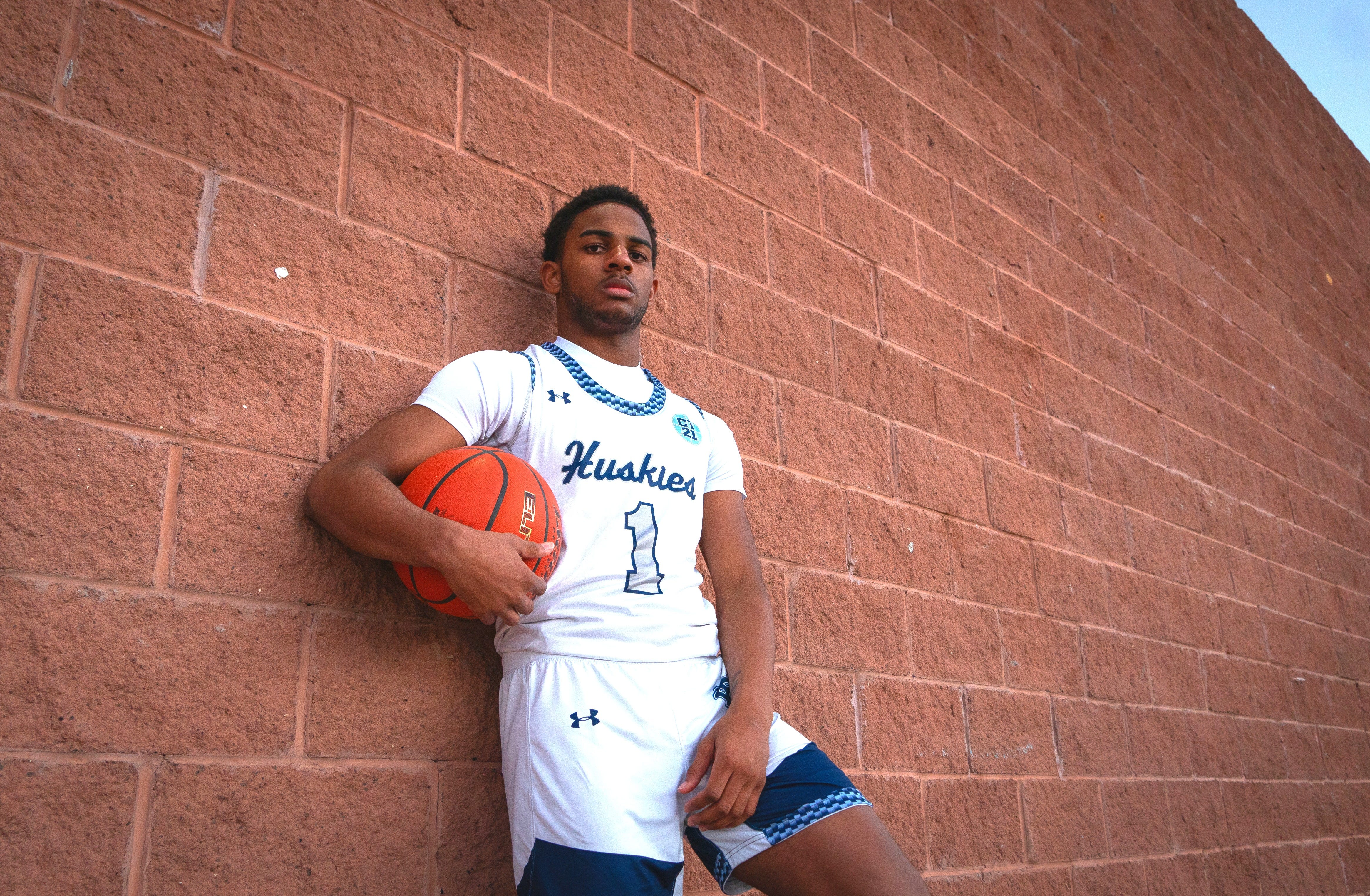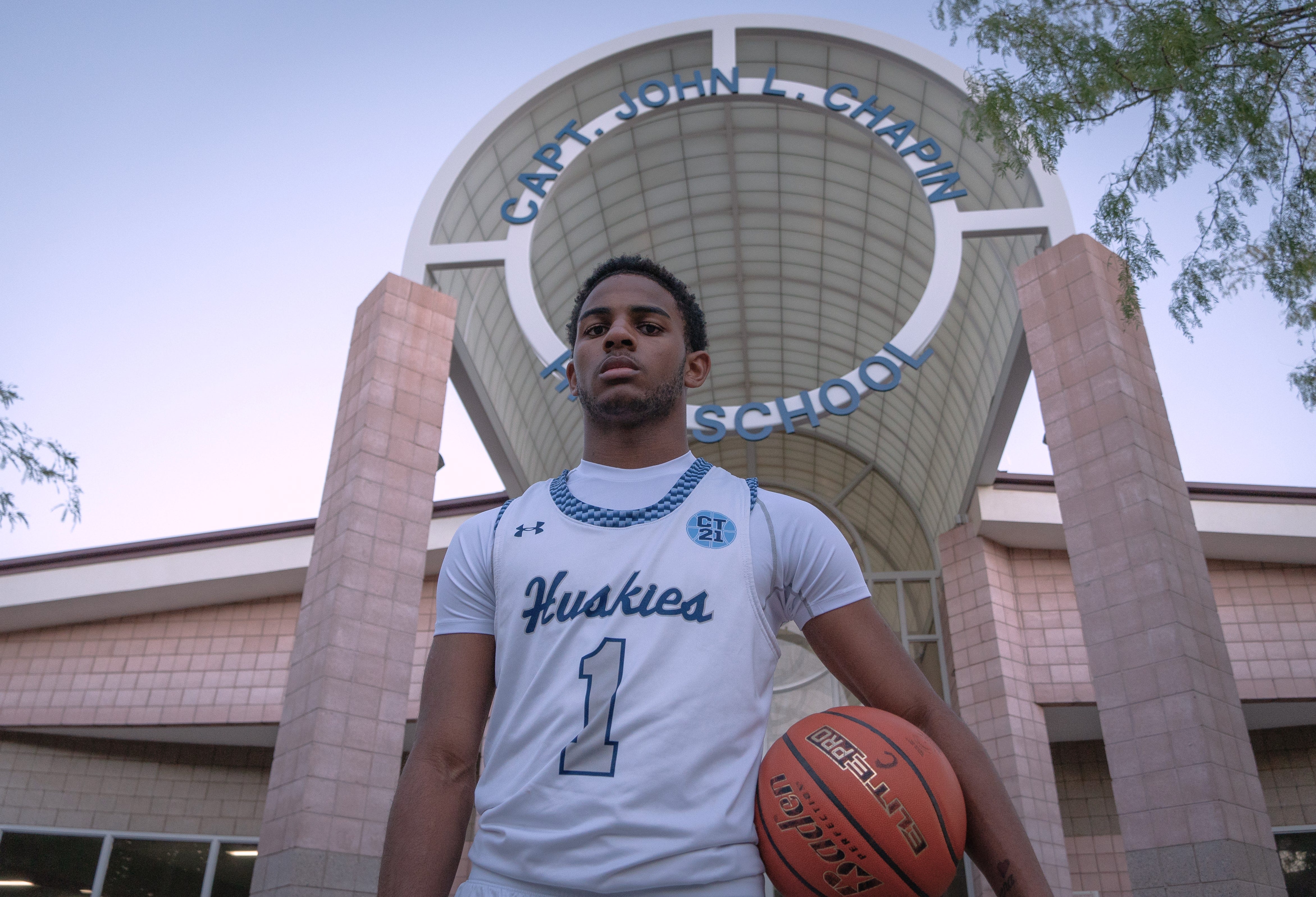Savion Jordan is a Quiet Kid but His Game is LOUD
The senior guard has waited in line at perennial powerhouse Chapin High School for the past three years; now, it's his turn to show up and show out.
When Rodney Lewis stepped down as the head coach of the Chapin boys' basketball team, an era ended. In six years, Lewis transformed the Huskies into a perennial powerhouse within the city of El Paso and a recognized elite program across the state of Texas.
The belief within the program was that their up-and-coming assistant coach, Daniel Castillo, brother of Franklin boy’s basketball head coach Adam Castillo, would take over. Lewis recommended him for the job only for him not to get hired. The reasons are still unknown publicly and privately.
With that, the top program in El Paso was in flux—late in the summer months with no head coach and few applicants in the next wave of interviews.
Not even a month into retirement, Lewis opened his phone one day to a surprising text from one of his—now—former players. He was a returning senior with whom he had somewhat of a challenging dynamic over the past three years.
His former player asked him to reconsider retirement for one more run on behalf of the returning seniors. Although the sentiment of the text was not surprising, who it came from was.
Months earlier—Looking down his bench early in the fourth quarter, Lewis had a decision to make. His team was down, and his starting shooting guard was sitting with slumped shoulders and bad body language—a prerequisite to keeping the bench warm.
If you played for the former Chapin boy’s basketball head coach, there were standards and rules you had to abide by if you wanted to see the court.
The standard?
No bad body language.
The rule?
Savion Jordan was about to find out.
Lewis called Jordan up from the bench—then wearing the number two jersey for the Huskies—and as soon as he did, he reversed the decision.
Jordan walked to the scorer's table, and right before he could get back in, Lewis promptly told him to sit back down. The rule is, when Coach Lewis calls your name, you sprint to the scorer’s table, look back, and ask who you are going in for.
Rules are rules, regardless of situation, score, and its possible effect on outcomes.
The game in question was the 2024 5A Regional Final, with the winner advancing to the 5A Texas State Championship—the Final Four—a place Chapin had yet to go in their dominant six-year run under Lewis.
When he took the job in 2018, Lewis envisioned turning a once-good El Paso school into a great Texas boys’ basketball program. His long-term goal was a state championship.
Chapin would end up losing to Amarillo 50-41.
Internally, everyone in the program knew it would be Lewis’ final season, which made falling short of a state championship all the more poignant.
His last game as the Huskies' and Jordan's coach was experienced from the same vantage point—the bench.
Even after being benched in the season's biggest game, Jordan saw the value in a man who coached him tirelessly and mercilessly for the past three years. But that wasn’t always the case.
An authoritative coach with a broader perspective and a talented kid who wasn’t fully aware of his potential at the beginning. Naturally, that creates friction.
When Savion first entered the program, he didn’t understand why he was being coached so hard. Lewis will admit that few in-depth conversations transpired between the two during those three years.
This brings us back to the text in the Summer. Considering the Lewis-Jordan dynamic up to that point, it’s not the type of gesture one would expect. Moreover, it’s not emblematic of how every talented kid in this area responds to hard coaching. But that is the story of Savion Jordan—it is somewhat unexpected.
It is not straightforward, with a smooth progression; it is one of struggle, conflict, growth, and opportunity.
The latter of which Jordan seems primed and ready for.
A common misconception about Chapin boys' basketball is that it is a team full of talented individuals who play for themselves. If you want to play for the Chapin boys' basketball team, there are two things you must do without question: put in the work and sacrifice.
Savion Jordan wasn’t ready to do both when he first came into the program.
Sacrifice for the Chapin boy’s team is more of a formality than a choice—you will have to face it whether you like it or not. Everyone waits their turn; the question is, will you accept it?
“When you play for me, the expectations and accountability are high,” Rodney Lewis said. “I’m an asshole, I’m a stickler, an old school coach. I believe you are supposed to act and behave a certain way. But when you do that, I will reward you with everything I have.”
“His first couple of years, we didn’t see eye to eye, needless to say. I probably wasn’t his favorite coach,” Lewis added.
“Savion had it hard,” Lewis concluded.
One of the main reasons Lewis resigned from a dominant program he tirelessly worked on building was that there were no breaks. There is no “off-season” for those who inhabit the Chapin program.
In the case of Jordan, it wasn’t necessarily a matter of poor work ethic or laziness but rather a conflict of options and talent. If you ask anyone who has seen Savion Jordan play over the past three years, they will tell you how great of a talent he is.
A football talent, that is. For as dynamic and explosive as he is on the basketball court, his truest talent resided on the gridiron. Jordan will tell you himself that he was a better football prospect than he is in basketball.
He was a two-way varsity player for the Chapin football team from 2022 to 2023.
In 15 games for the Chapin football team, Jordan caught 38 passes for 699 yards—21 percent of his receptions went for touchdowns. For reference, anywhere from 12 to 15 percent is largely considered elite. It’s a small sample size, but it is on par or better than some of the top receivers in El Paso from the 2024 high school football season.1 He also led the Huskies in yards per reception in back-to-back seasons. 2 3
During the Summer months, he wasn’t always in the gym working on his game or with his teammates.
But he also wasn’t at home resting on his laurels.
You could find him in Florida attending football camps with his father, who lives in the Sunshine State. The dual conflict wasn’t something Lewis would negotiate with, not even for someone as talented as Jordan.
“I’m not the type of coach to wait on players,” Lewis said. “When you come into the gym, you gotta come correct if you are going to try to take someone’s spot. He never did. Maybe he felt like I should have just moved him up. But that is not how it goes. So when he made the decision last year not to play football, I gave him his propers; he ended up starting.”
Jordan’s decision to ultimately choose basketball over football had to do with culture and accountability. Playing on the football team, he found that the standards weren’t as serious as they were under Coach Lewis. At first, he struggled with Lewis's hard-nosed approach but came to appreciate its effectiveness in other environments.
“When I come to basketball, the team is really serious. Our goal is winning state, so everyone is locked in all season, every practice,” Jordan said. “Like we come in to practice trying to get better every day, and with football, that just wasn’t the case.”
The Lewis-led Huskies were all about sacrifice—not only of ego, minutes, and points but more broadly of individual aspirations. If you wanted to get to where you dreamed of going—like Jordan and other players in the program so often do—you then have to make it about what you were giving the team.
“I was better at football but it was getting to the point where I didn’t love the game how I used to,” Jordan added. “I felt like putting everything into football wasn’t getting me anywhere. Even though I was getting looked at for college, from a team standpoint, I didn’t feel like it was a good situation for me.”
Jordan left a sport he was obviously more talented at to buy into a program built on sacrifice, team ethos, and hard work. Moreover, he left a sport he had played since he was a kid, a sport he loved that was nurtured through his grandfather, who coached him since his youth football days. He ultimately chose the situation that challenged him to be a better competitor and person.
From a recruiting standpoint, the chances of Jordan playing Division I college basketball out of the gate are unlikely. Some of that has to do with his decision to put an emphasis on football early on. But in fairness, it also has to do with where he resides.
El Paso is largely thought of as a recruiting wasteland—a barren city that lacks talented prospects who can play at the highest collegiate levels. It’s safe to say that Jordan, like his former teammate Brandon Hymes—who was the best player in the city last season as a 17-year-old senior—is being under-recruited.
His roadmap most likely involves the junior college (JUCO) route, which isn’t the easiest path to take. Usually, in smaller cities with little to do outside of basketball, JUCO programs are short on amenities, exposure, and spotlight.
Because of those glaring differences, most high school prospects won’t pursue the JUCO route, nor can they survive its unpaved road. It is a one to two-year commitment that requires sacrifice and a strong work ethic just to be recruited all over again.
“There is nothing wrong with that,” Jordan said, referencing the JUCO route. “To me, JUCOs are where the most dawgs are made because everyone is fighting for something.”
“As long as I stay locked in and keep putting in the work, I can go as far as I want to take it,” Jordan added. “I play the game because I love the game.”
For Jordan, sports is a way out—they provide opportunities and chances he otherwise wouldn’t have. Like many Northeast kids, there is an implicit hunger in how he plays and approaches the game. The only difference is he narrowed his focus to one.
Savion Jordan is a basketball player year-round.
When it comes to producing top-tier athletes, Northeast El Paso just might take the cake. Four high schools in close proximity—Andress, Parkland, Irvin, and Chapin High School are responsible for producing some of the best athletes to come out of the 915 in the past 25 years.
The history is unmatched, from Jeremiah Cooper to Deion Hankins to Kayla Thornton to Cliff Tucker. But if you dig deeper, there are athletes who slipped through the cracks of their respective fields and courts they dominated.
Savion Jordan is certainly part of the Northeast athletic lineage, but it runs even deeper than being from the Northeast—it’s genetic.
“His mom was a stud at Parkland,” Rodney Lewis said, recalling seeing Savion’s mom play when he was an assistant varsity coach for the Chapin boy’s team.
As time goes on, legends grow, but Sharena Wilson’s time at Parkland High School from 2004-07 needs no embellished stories. She was as great as they say she was.
“I would reference her to a little Allen Iverson,” said Nina Costley, a Parkland alumni who played for the Matadors from 2001-04, sharing the court with Wilson her senior year. “Overall, she was quick, pretty fast. If she stole the ball, she would be down the other end of the court immediately.”
“Sharena came in making noise as a freshman,” Costley added.
In a freshman game at the beginning of the season, Wilson scored somewhere between 40 to 45 points. The reasons why she was on the freshman team to begin with are unknown, but it would be her last.
“I think it was 40,” Wilson said humbly, trying to recount the point total in question. “I can’t remember the exact number, but I believe it was 40. I don’t believe it was more than that.”
Parkland would go on to win the 2-4A and 4A bi-district titles that same season. Wilson scored a team-high 20 points with five steals and three blocks in the championship game against Jefferson.4
The Matadors fell to the Plainview Lady Bulldogs in the next round, led by legendary head coach Danny Wrenn—one of the winningest coaches in Texas high school basketball history with 700 plus wins and three state titles to his name.5
Even before their area round matchup, Wrenn identified the freshman Wilson as Parkland’s best player and athlete “by far.” 6
In her four years at Parkland, Wilson received just about every accolade one could get, from Newcomer of the Year to Defensive Player of the Year (Twice) to All-City and All-State (Defense). In addition to her basketball exploits, Wilson was a pretty good track athlete, with a time of two minutes and 26 seconds in the 800 meters as a junior in 2006—a school record at the time.7
For as brilliant of a high school career Wilson had, there was an unexpected turn that would take place her senior year.
She got pregnant, cutting short her senior year, during which she averaged 16.6 points, 5.4 steals, and 2.5 blocks per game.8 Somehow, Wilson managed to get back in shape in the offseason and played some travel tournaments during the Spring and Summer months after giving birth.
By doing so, along with her high school resume, she got picked up by Texas Western, a JUCO in Snyder, Texas. By the next season, she was on the 2007—08 roster under then-head coach Tammy Davis.
The child in question?
Savion Jordan.
“My mom, not even just for me but for me and my brother, has sacrificed so much,” Jordan said. “There’s been times where she doesn’t feel good and she’ll still take us to practice or workouts because she wants to see us be the best that we can. I always just want to do my best to give back to my mom.”
Wilson did more than just pass down some genetic gifts. To this day, she offers critiques of her son’s game and areas he can improve, not only from the physical but the mental as well.
“I’m always on him telling him what I see,” Wilson said. “Body language is a big thing. It’s gotten better since his freshman year. I just tell him not to let his opponents see his frustration.”
“I’m proud of him because he didn’t give up,” she added. “I let him know, keep working hard, and it will come to you.”
Not every great athlete is a mystery. Sometimes, you just have to look at where they come from. The apple didn’t fall far from the tree in Jordan's case.
“Savion is one of those kids that if you put him in any sport, line him up anywhere; he is one of the best athletes,” said Paris Wall, a Certified Strength & Conditioning Specialist (CSCS) based in East El Paso. “In any situation you put him in athletically, he is one of the most inclined, progressed, and mature-built athletes you will see in the city by a long shot.”
Wall was on the Chapin coaching staff before departing from the program after Lewis’ resignation. He still works with Chapin players, including Jordan, to this day.
“If he was doing pole vault with a pool stick, he would figure out how to be special at it just by being confident,” Wall added. “He has that attitude where you can present anything to him, and he will just smirk [as if to say] I can do that.”
From fastbreak dunks to jumping passing lanes like a free safety, his ability to outrun and jump his opponents is rare for this area, as is his confidence.
While the raw athleticism has always existed, the skill development seems to have finally come along in his final season. In the past, Jordan looked like an athlete playing basketball with blistering speed and verticality.
But at times, his ability to downshift, or lack thereof, got in his own way. Jordan has shown progress with a full off-season in the gym by learning how to vary his speed and read the defense while still using his athleticism.
“He’s able to get to places in tight spaces that have me speechless at times,” said Chapin Head Coach Tevin Caldwell.
Hired late into the offseason, Caldwell came into the job unfamiliar with much of the talent he was inheriting. The first-year head coach sometimes finds himself in awe, especially with talents like Jordan.
“He’s very athletic,” Caldwell continued. “He’s great at maneuvering his body around with different types of side steps and euro steps in the paint. It’s unorthodox the way he moves his body, but it is very effective the way he likes to play. I love it, and it’s good for our program.”
Far too often, great athletes are typecasted as the lucky ones who hit the genetic lottery without receiving credit for their work ethic. According to Paris Wall, Jordan is one of the most diligent workers in the weight room, with a sharp focus and efficiency that other prospects lack. Wall credits that to a football mentality.
Genetic or inherited athletic gifts aside, just make sure you give credit to Jordan first.
In some ways, a lot has changed since Savion Jordan first stepped foot on campus at Chapin High School. In other ways, things are the exact same. That is the cycle of any program and life—the same stories and sets with some new and returning characters in evolving roles.
Once an immature underclassman, Jordan wondered why his coach pushed him so hard or made him run for cracking jokes and laughing in practice. Back then, he felt picked on; now, he gets it. The irony of it all is that Jordan will find himself in practice observing his surroundings—watching underclassmen conduct themselves with the same lack of focus and unseriousness he once had.
The difference now is who holds who accountable— same characters, evolving roles.
Rodney Lewis never asked Savion Jordan to be a leader. He never really asked him to speak outside of practice and game action, calling out screens, weakside help defense, and all the other communication responsibilities that come with playing team basketball.
Caldwell showed up and got a leader without asking.
The new dynamic between Caldwell and his star shooting guard is emblematic of how the unexpected can prove more beneficial than first laid plans.
It was never supposed to be Tevin Caldwell. He was an Eastside guy, a Mike Brooks disciple with a style and temperament that was different from what the Chapin players had come to know and eventually appreciate from Lewis.
Caldwell is an El Paso native and an American alumnus. He played for legendary Blazers Head Coach Mike Brooks from 2007-11. After high school, he took the JUCO route before spending his final three years back home playing for Tim Floyd and the UTEP Miners.
After paying his dues at Pebble Hills for five seasons and one season at Americas under Brooks, Caldwell took up the unexpected opportunity. Considering what Lewis built in six years, it was big shoes to fill—a dominant powerhouse with aspirations and talent beyond the city limits.
Caldwell couldn’t be more different than Lewis.
The former Chapin program leader was boisterous, unapologetic, and overwhelmingly looming from the sideline. His built-in credibility of nurturing and rearing Northeast El Paso kids—a largely underserved and negatively stereotyped community—was also done with a certain sensibility and language to match the area.
Still in his 30s, Caldwell is mild-mannered with a language and sensibility undeniably different from the space he now inhabits. He doesn’t emote the same way Lewis did, nor does he run an offense or practice the same way Lewis did.
One could argue that a player like Savion Jordan, who once struggled with Lewis's style and demeanor, would miss out on its eventual benefits. Lewis had a track record of developing and sending players to the next level.
KJ Lewis at the University of Arizona, Brandon Hymes, a JUCO product who is well on his way to being a DI player, and Jayden Leverett, a Chapin senior who still has Lewis in his ear as he enters Vanderbilt University in the SEC next Fall.
Those are just a few.
So what does Caldwell offer?
Certainly, not the Lewis experience, but maybe the exact experience Jordan needs in the final stages of his maturation process as a high school senior. The ultimate test of accountability is one's ability to hold oneself accountable.
With no taskmaster like Lewis in the fold and a new coach like Caldwell who takes a different approach, the results seem to be showing.
“He does a great job of holding guys accountable,” Caldwell said. “First week of practice, guys were missing layups and stuff. Savion was one of the first ones to call them out and tell them to pick it up. He’s not just accountable for others but himself, most importantly. There was one time, he couldn’t get a ride to practice, he called me right away, told me he was going to own up to that mistake and do his punishment once he got to practice. That’s just the type of person he is: a natural leader. The kids really feed off his energy.”
A lot has changed since Savion Jordan was benched in his final game under Lewis, wearing the number two.
Lewis and number two are out. Caldwell and number one are in. Wearing number one at Chapin is not a formality nor a preferential choice players get to make. It signifies many things.
A Leader.
A Dawg.
A Winner.
The head of the snake.
“When you wear number one at Chapin, it comes with a lot of responsibilities,” Lewis said. “You follow in the footsteps of KJ Lewis, Idalius Coleman, and Brandon Hymes. If you accept the role of being that guy, you have to be an all-around leader, and I truly believe Savion can do it.”
Ultimately, the unexpected coaching change could signify that Savion Jordan no longer needs to be led. He doesn’t need to be told to run sprints, to stop joking, or to wait in line.
Jordan is the one who needs to lead.
“Something we like to say to each other is you can’t love someone if you don’t hold them accountable,” Jordan said. “We’re all brothers and family. We love each other so we all got to hold each other accountable.”
The beauty of the unexpected is that his previous coach's molding has allowed him to take the next step with his new coach.
Time is up, so what will it be, Mr. Jordan?







